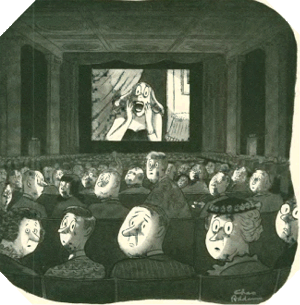
"Vainly I had sought to borrow … surcease of sorrow. Darkness there and nothing more.”
... Poe (1809-49), "The Raven"

 The fairy tale image of the friendly giant found dead in his orchard lying under a soft blanket of tree blossoms by bewildered, adoring children conveys a wondrous sense of beauty in profound sadness. Such poetry, if we can call it that, attempts through sheer force of will to burst the fetters of aching pain, or at least to alleviate it through absorption in a happy past. But not just in fairy tales; these attempts happen in music and art too ... however, alas, all in vain! The clear and present reality is agonizingly stark, for the heart does not lose something -- it loses everything.
The fairy tale image of the friendly giant found dead in his orchard lying under a soft blanket of tree blossoms by bewildered, adoring children conveys a wondrous sense of beauty in profound sadness. Such poetry, if we can call it that, attempts through sheer force of will to burst the fetters of aching pain, or at least to alleviate it through absorption in a happy past. But not just in fairy tales; these attempts happen in music and art too ... however, alas, all in vain! The clear and present reality is agonizingly stark, for the heart does not lose something -- it loses everything.
Grief is not date-stamped. Lines written by John Donne (1572-1631) or Ben Jonson (1572-1637) or Anne Bradstreet (1612-72) cannot be surpassed in controlled agony, nor can Poe's anguished "nevermore" lament resignedly muttered repeatedly in his poem "The Raven". But where words leave off, music begins as in Chopin's (1818-49) magnificent Nocturne Op.48 No.1. It was described eloquently by a contemporary as a work whose “chief subject is a masterly expression of a great powerful grief ... told in an agitated recitando; celestial harps come to bring one ray of hope, which is powerless in its endeavor to calm the wounded soul, which sends forth to heaven a cry of deepest anguish. There are fevers and cold sweats in this music; it is not healthy music, and it is not to be performed in a robust manner, but rather rendered almost as if in a somnambulant daze, with a tremulous delicacy of intensity, as if it were a living thing whose nerves were being operated upon, where every touch might mean life or death”:
[http://www.youtube.com/watch?v=h_vZtpjNKVE&feature=player_embedded]
[http://www.youtube.com/watch?v=h_vZtpjNKVE&feature=player_embedded]
Perhaps Beethoven’s (1770-1827) weighty "marcia funebre" of the Eroica Symphony plumbs the pathetic depths of grief as powerfully as any ... so much so that people reportly were unnerved, even spooked by it in early concert performances ... a work considered then in 1805 to be a dramatically "new", even "revolutionary" kind of music:
[http://www.youtube.com/watch?v=PJj9EydBM5g&feature=player_embedded].
In this noble and expressive passage of fugal music we might well be present at the actual obsequy of a renowned and deeply loved person, with all that is good and great looking on as bodily remnants of insensate dust are respectfully and ceremoniously dispatched; and the motto might well be Tennyson's (1809-92) eloquent words:
"In the vast cathedral leave him,In this noble and expressive passage of fugal music we might well be present at the actual obsequy of a renowned and deeply loved person, with all that is good and great looking on as bodily remnants of insensate dust are respectfully and ceremoniously dispatched; and the motto might well be Tennyson's (1809-92) eloquent words:
God accept him, Christ receive him."



very beautiful rendition indeed Mr Townsend.
ReplyDeleteRoxanne
The Chopin nocturne (Op48 No1) is one of those classical piano works that are immensely and deceivingly difficult to perform. It takes a considerable virtuoso techical ability to provide just the musical backdrop and freedom for what really needs to be conveyed emotionally and artisically. Few have the emotional depth and maturity required to pull it off beyond just a bravura technical performance. This piece really separates the men from the boys of piano
ReplyDeletemasters. The Rubinstein recording selected here certainly ranks among the few that give Chopin his due.